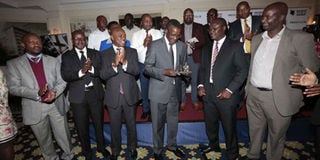We’re committed to graft war, says CJ David Maraga

Chief Justice David Maraga receives a gift from Editors Guild Chairman Churchill Otieno (right) during the launch of the Press Club at The Stanley Hotel in Nairobi on June 12, 2018. Nation Media Group Editor-in-Chief Tom Mshindi (left) and other editors look on. PHOTO | MARTIN MUKANGU | NATION MEDIA GROUP
What you need to know:
Justice Maraga said corruption will not be tolerated among judicial officers.
Kenya National Commission on Human Rights Vice-Chair George Morara challenged editors to relook the way they make Kenya’s elections a never-ending cycle.
Chief Justice David Maraga has promised that the Judiciary’s fight against corruption will be waged from both within and outside its ranks.
Asking other State agencies to support the courts, Justice Maraga said corruption will not be tolerated among judicial officers.
“As the Judiciary, we have adopted a zero-tolerance policy to corruption, both internally as an institution as well as matters that are brought to our courts,” said the CJ at an event organised yesterday by Kenyan editors in Nairobi. “The current effort to stem the vice is an important process for all of us,” he said.
The CJ made the promise while giving the keynote address at a luncheon for the Kenya Editors Guild’s new project — the Press Club. During the forum on freedom and responsibility of the media, the Judiciary was put to task on why it has been awarding hefty sums to those who win libel cases against media houses.
“We must find it odd that when it comes to court awards, suing the media is fetching more than losing a limb in an accident,” said the Guild’s Chairman Churchill Otieno.
LESSER DAMAGES
“How do we explain that a paraplegic is awarded lesser damages for injuries sustained in an accident than the same person would get for three lines of libel in a newspaper?” wondered Mr Otieno, who is also Nation Media Group’s digital editor.
Speakers also took issue with the rising number of gag orders by courts against media houses. Mr Otieno said such orders, especially pre-emptive ones, are gaining currency.
His position was echoed by Kenya Union of Journalists Secretary-General Eric Oduor. “Nowadays, if somebody is not comfortable with ongoing stories in the media, they run to the Judiciary and get gag orders,” he said.
But the CJ defended the Judiciary. “The courts are not gagging the media on a general kind of situation. Each case is decided on its own facts that are brought before the court,” he said.
DEMOCRACY
“When you feel that you are aggrieved by a court order, please challenge it on appeal. And we have had quite a number of decisions of our courts upset on appeal,” he added.
The forum, whose topic was “The Media, Constitutionalism and Democracy – What Options for Kenya”, was attended by editors from different media houses. Mr Otieno said the Guild would hold quarterly round-table meetings for peer review.
“It has also committed to hold county town hall sessions to ensure the media serves more than just the interest of the elite and privileged,” he said.
Kenya National Commission on Human Rights Vice-Chair George Morara challenged editors to relook the way they make Kenya’s elections a never-ending cycle.
EDITORIAL PRIORITIES
“When the votes are counted and the electoral circus tents are taken down, immediately the discourse shifts to the next election. What are we doing in terms of our editorial priorities?” he asked. He also asked media houses to give journalists decent pay. Outgoing US Ambassador to Kenya Robert Godec said he was looking forward to more established freedom of the press. “It’s critical in maintaining the democracy which you have built,” he said.
Speaking for the Media Owners Association (MOA) , Nation Media Group’s Editor-in-Chief Tom Mshindi said they were ready to give all the support that editors needed. “I hope we will see a lot more forums after today’s inaugural one. We fully support this initiative and we intend, as MOA, to back it as much as we can,” said Mr Mshindi.
ILLEGALITY
Standard Group Chief Executive Orlando Lyomu challenged media practitioners to redefine their perception on patriotism. “A lot of times, as the media we find ourselves at a crossroads, where by doing what we are supposed to do, we are either labelled left or right, black or white,” he said.
Veteran editor Macharia Gaitho took the audience back to the events of January when the State shut down transmission signals of TV stations, saying the government was wrong to say that broadcasting an illegality is illegal.
But the CJ said: “That’s a live issue in court, I’m not going to comment on that.”





